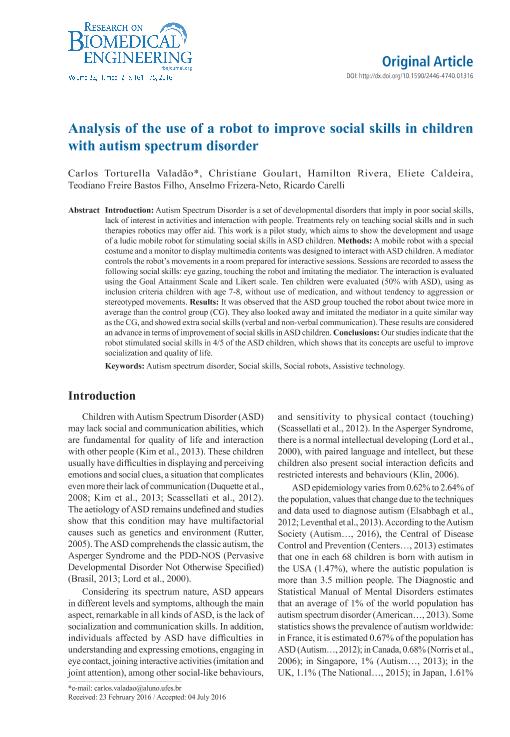Mostrar el registro sencillo del ítem
dc.contributor.author
Valadão, Carlos Torturella
dc.contributor.author
Goulart, Christiane
dc.contributor.author
Rivera, Hamilton
dc.contributor.author
Caldeira, Eliete
dc.contributor.author
Bastos Filho, Teodiano Freire
dc.contributor.author
Frizera-Neto, Anselmo
dc.contributor.author
Carelli Albarracin, Ricardo Oscar

dc.date.available
2018-08-16T14:51:10Z
dc.date.issued
2016-06
dc.identifier.citation
Valadão, Carlos Torturella; Goulart, Christiane; Rivera, Hamilton; Caldeira, Eliete; Bastos Filho, Teodiano Freire; et al.; Analysis of the use of a robot to improve social skills in children with autism spectrum disorder; Sociedade Brasileira de Engenharia Biomédica; Revista Brasileira de Engenharia Biomedica; 32; 2; 6-2016; 161-175
dc.identifier.issn
1517-3151
dc.identifier.uri
http://hdl.handle.net/11336/55877
dc.description.abstract
Introduction: Autism Spectrum Disorder is a set of developmental disorders that imply in poor social skills, lack of interest in activities and interaction with people. Treatments rely on teaching social skills and in such therapies robotics may offer aid. This work is a pilot study, which aims to show the development and usage of a ludic mobile robot for stimulating social skills in ASD children. Methods: A mobile robot with a special costume and a monitor to display multimedia contents was designed to interact with ASD children. A mediator controls the robot’s movements in a room prepared for interactive sessions. Sessions are recorded to assess the following social skills: eye gazing, touching the robot and imitating the mediator. The interaction is evaluated using the Goal Attainment Scale and Likert scale. Ten children were evaluated (50% with ASD), using as inclusion criteria children with age 7-8, without use of medication, and without tendency to aggression or stereotyped movements. Results: It was observed that the ASD group touched the robot about twice more in average than the control group (CG). They also looked away and imitated the mediator in a quite similar way as the CG, and showed extra social skills (verbal and non-verbal communication). These results are considered an advance in terms of improvement of social skills in ASD children. Conclusions: Our studies indicate that the robot stimulated social skills in 4/5 of the ASD children, which shows that its concepts are useful to improve socialization and quality of life.
dc.format
application/pdf
dc.language.iso
eng
dc.publisher
Sociedade Brasileira de Engenharia Biomédica
dc.rights
info:eu-repo/semantics/openAccess
dc.rights.uri
https://creativecommons.org/licenses/by-nc-sa/2.5/ar/
dc.subject
Assistive Technology
dc.subject
Autism Spectrum Disorder
dc.subject
Social Robots
dc.subject
Social Skills
dc.subject.classification
Ingeniería de Sistemas y Comunicaciones

dc.subject.classification
Ingeniería Eléctrica, Ingeniería Electrónica e Ingeniería de la Información

dc.subject.classification
INGENIERÍAS Y TECNOLOGÍAS

dc.title
Analysis of the use of a robot to improve social skills in children with autism spectrum disorder
dc.type
info:eu-repo/semantics/article
dc.type
info:ar-repo/semantics/artículo
dc.type
info:eu-repo/semantics/publishedVersion
dc.date.updated
2018-08-15T13:57:10Z
dc.journal.volume
32
dc.journal.number
2
dc.journal.pagination
161-175
dc.journal.pais
Brasil

dc.journal.ciudad
Uberlandia
dc.description.fil
Fil: Valadão, Carlos Torturella. Universidade Federal do Espírito Santo; Brasil
dc.description.fil
Fil: Goulart, Christiane. Universidade Federal do Espírito Santo; Brasil
dc.description.fil
Fil: Rivera, Hamilton. Universidade Federal do Espírito Santo; Brasil
dc.description.fil
Fil: Caldeira, Eliete. Universidade Federal do Espírito Santo; Brasil
dc.description.fil
Fil: Bastos Filho, Teodiano Freire. Universidade Federal do Espírito Santo; Brasil
dc.description.fil
Fil: Frizera-Neto, Anselmo. Universidade Federal do Espírito Santo; Brasil
dc.description.fil
Fil: Carelli Albarracin, Ricardo Oscar. Consejo Nacional de Investigaciones Científicas y Técnicas; Argentina. Universidad Nacional de San Juan; Argentina
dc.journal.title
Revista Brasileira de Engenharia Biomedica

dc.relation.alternativeid
info:eu-repo/semantics/altIdentifier/doi/https://dx.doi.org/10.1590/2446-4740.01316
dc.relation.alternativeid
info:eu-repo/semantics/altIdentifier/url/http://ref.scielo.org/t3zh4z
Archivos asociados
